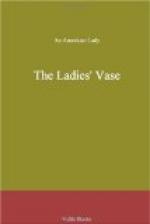If these hints induce only one person to take better care of the teeth, I shall be more than rewarded for the trouble of writing. It is painful to see young persons losing their teeth merely for want of a few simple precautions; and one cannot enter stage or steam-car without finding the atmosphere polluted, and rendered absolutely unhealthy for the lungs to breathe, when a proper use of water and charcoal might render it as wholesome and pleasant as a breeze of Eden.
THE HAIR.
No part of the human frame offers a finer subject for the display of decorative taste and elegance than the hair:—the countenance, the contour of the head, and even the whole person, may be said to be greatly affected by its arrangement and dress. As the possession of fine hair is peculiarly prized, so is its loss proportionally felt.
Like every other portion of the human frame, the use of water to the hair is absolutely essential to its health, as it tends to relieve the secretions and open the pores of the skin. The frequency of the use of water, however, should be guided by circumstances. It may be set down as a regulating principle, that the stronger and more healthy the hair may be, the more water may be used with propriety; by the same rule, when the hair is weak and thin, it should not be washed more than once a-week. At such times, cold water alone should be used, when care should be taken to dry it well immediately after. Washing too often, dries up the requisite oily fluid that forms the nourishment of the hair.
Some judgment is necessary in the choice of brushes. Two are necessary: a penetrating and a polishing brush; the one composed of strong, and the other of fine hair. The penetrating brush (especially that used by ladies) should be made of elastic hairs, rather inclining to irregular lengths. The other should be made of firm, soft, silken hair, thickly studded. Unfortunately, however, we cannot but observe that penetrating brushes are often selected, so harsh and strong, that they fret the skin of the head, and injure the roots, instead of gently and gradually effecting the object for which they were intended.
Combs are merely used for the purpose of giving a form to the hair, and assisting in its decorative arrangement; to use them too often, is rather prejudicial than otherwise, as they injure the roots of the hair. Above all kinds, that of the small-toothed comb is the most injurious in this respect, as it not only inflames the tender skin, but, from the fineness of its teeth, splits and crushes the hairs in being passed through them. Persons must indeed be of very uncleanly habits, whose heads absolutely require the aid of this comb, as the brush alone sufficiently possesses the power of effectually cleaning the hair from scurf, dandriff, and dust, if constantly used.
To persons whose hair is in a declining state, the frequent and regular use of oil or bear’s grease is often of much service, as it is calculated to assist in supplying that nourishment which is so necessary. No oil perhaps has ever acquired a greater celebrity than Rowland’s Macassar; for this reason we cannot but recommend it to the notice of our readers.




